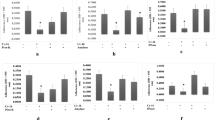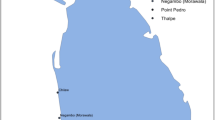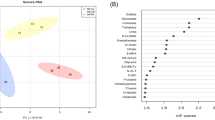Abstract
IN 1942, through the kindness of Dr. A. P. Orr of the Marine Station, Millport, specimens of agars of known history were examined to see if evidence could be secured for the formulation of Jones and Peat1, which demands a relatively high sulphur content (S, 1·8 per cent; that is, SO4, 5·4 per cent).
This is a preview of subscription content, access via your institution
Access options
Subscribe to this journal
Receive 51 print issues and online access
$199.00 per year
only $3.90 per issue
Buy this article
- Purchase on Springer Link
- Instant access to full article PDF
Prices may be subject to local taxes which are calculated during checkout
Similar content being viewed by others
References
Jones and Peat, J. Chem. Soc., 225 (1942).
Barry and Dillon, Chem. and Ind., 63, 167 (1944).
Pereival and Thomson, J. Chem. Soc., 750 (1942).
Hands and Peat, Chem. and Ind., 57, 937 (1938).
Forbes and Percival, U. Chem. Soc., 1844 (1939).
Duff and Percival, J. Chem. Soc., 830 (1941).
Author information
Authors and Affiliations
Rights and permissions
About this article
Cite this article
PERCIVAL, E. Ethereal Sulphate Content of Agar Specimens. Nature 154, 673–674 (1944). https://doi.org/10.1038/154673b0
Issue Date:
DOI: https://doi.org/10.1038/154673b0
This article is cited by
-
Mucilage of Dumontia incrassata
Nature (1950)
Comments
By submitting a comment you agree to abide by our Terms and Community Guidelines. If you find something abusive or that does not comply with our terms or guidelines please flag it as inappropriate.



